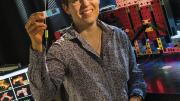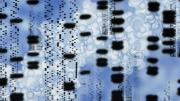Jennifer Lewis’s engineered materials look to nature as a guide. The new Wyss professor of biologically inspired engineering uses 3-D printing to build minuscule devices, from microbatteries to synthetic spider webs of threads a micron thick. Now she works to “print” biology, motivated by “a bit of naiveté mixed with a strong desire to benefit society.” Her lab develops “inks” with functional properties: cell-laden ones to print 3-D tissues, or conductive inks that flow through rollerball pens at room temperature to draw functional circuits on paper. Lewis works with high-school teachers to incorporate these inexpensive pen-on-paper electronics in their classes, so students can explore engineering through circuit design. Her educational interest draws on personal experience: despite coming from a family of engineers—her father worked for General Electric, and her sister is a chemical engineer—Lewis first encountered materials science in college at the University of Illinois. She later joined the faculty and taught there for 20 years (after earning her S.D. at MIT), returning to Cambridge for her new appointment in January. The move back East has given Lewis, an avid basketball player, a chance to pick up her squash racket again, as well. She’s also been exploring Boston through another longtime hobby: one of this fiction fan’s recent favorites is The Dante Club, a whodunit set in Civil War Cambridge, which helped immerse Lewis in her new community. She and her partner, Lori Sanders, who also studies biomaterials, live near the undergraduate Houses, “right in the heart of things,” and Lewis enjoys the intellectual stimulation of her new home: “It’s time to stretch and grow in new directions.”
Harvard bioengineering professor Jennifer Lewis prints 3-D on a micron scale
Harvard bioengineering professor Jennifer Lewis prints 3-D on a micron scale
The bioengineering professor does 3-D printing on a micron scale.

You might also like
Harvard Faculty of Arts and Sciences Appoints a New Finance Dean
Warren Petrofsky joins at a crucial moment when the FAS is dealing with a $350 million deficit.
Harvard Graduates Can Donate Directly to Their Houses on Housing Day
A new initiative encourages small-dollar donations for improving student life.
A Cap on A’s at Harvard? Students and Faculty Raise Concerns at Town Hall
Dozens debate the grade inflation proposal that faculty will discuss next week.
Most popular
Explore More From Current Issue

How a Harvard and Lesley Group Broke Choir Singing Wide Open
Cambridge Common Voices draws on principles of universal design.

These Harvard Mountaineers Braved Denali’s Wall of Ice
John Graham’s Denali Diary documents a dangerous and historic climb.

At Harvard’s Beck-Warren House, Ghosts Speak Many Languages
The quirky 1833 home now hosts Celtic scholars.





